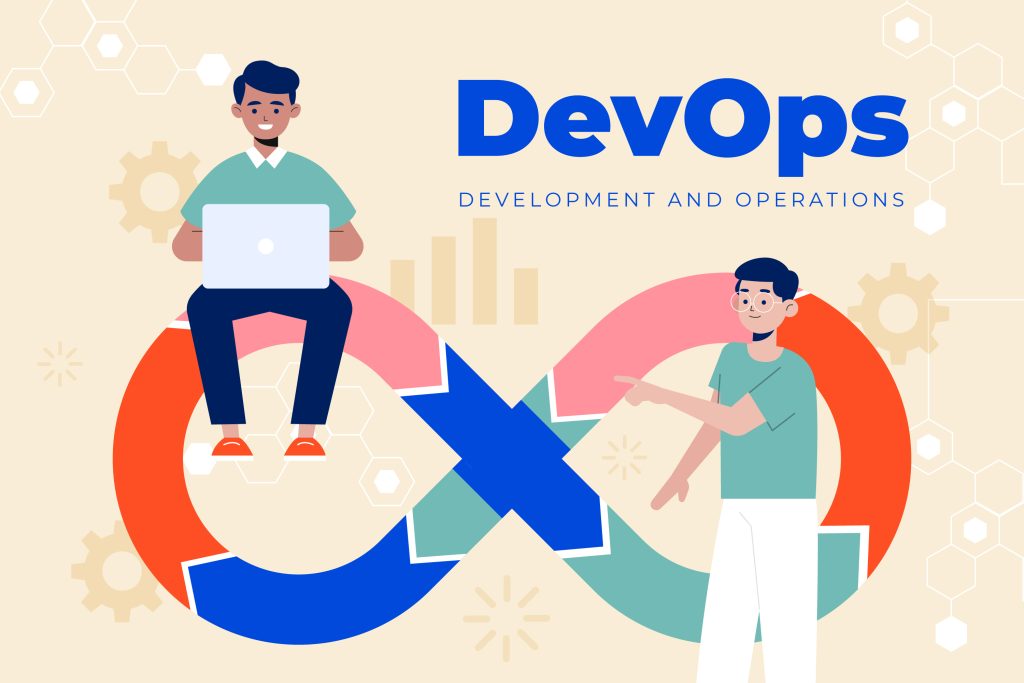
Table of Contents
DevOps Revolution
Software development and deployment have undergone a sea of changes as a result of the DevOps Revolution. It entails a radical shift in the software industry’s cultural norms towards more emphasis on teamwork, automation, and incremental progress. The DevOps technique is built on a comprehensive approach that promotes open communication and joint responsibility between the development and operations teams.
The goal of this article is to break down the building blocks of this revolution, illuminating the ideas, tools, and practices that propel today’s IT settings towards higher levels of productivity, dependability, and creativity.
| Why Do Businesses Need Devops? |
| Quicker Entry into the Market |
| Greater Cooperation |
| Productivity and efficiency enhancements |
| Enhanced Stability and Dependability |
| Savings on expenses |
| Ability to Adapt |
What’s the DevOps Phenomena and Its Inception?
The term “DevOps,” a combination of “development” and “operations,” describes a cultural and technological shift in the software development business within the context of the DevOps Revolution. It was introduced as an alternative to the traditionally separate roles played by developers and operations staff. Patrick Debois initially used it in 2009 at the Agile Toronto Conference, marking a major turning point that heralded a radical change in how software is created within the context of the DevOps Revolution.
DevOps Revolution is essential to the success of contemporary enterprises because it fosters efficiency, flexibility, and new ideas. It encourages teamwork by removing barriers to information sharing and conversation between the design and operations departments. The increased speed of development, the ease of deployment, and the capacity to respond to changing market needs are all benefits of this convergence.

Stages of DevOps
There are five major phases that make up the development lifecycle, all of which work together to improve software development and deployment teamwork, productivity, and quality:
- Plan
In this step, you will define your project’s objectives and map out a strategy for moving forward. Scope, priorities, and deadlines are all part of this process.
- Develop
The goal of the development stage is to create the actual programme by means of writing, coding, and construction. This is where the actual manufacturing of the product takes place.
Developers’ day-to-day includes coding, collaborating in repositories (like Git), reviewing code, and maintaining many versions. Tools for CI, or Continuous Integration, are used often to incorporate code changes.
- Build
The purpose of this step is to convert the source code created in the development phase into a form that can be run. This usually includes preparing the code by compiling, linking, and packaging.
- Test
The purpose of exhaustive testing is to guarantee that the final product performs as expected. At this point, the code is checked to ensure that it is both bug-free and up to standard.
- Deploy
The goal of deployment is to make the code available to users in a live setting. It keeps the programme running smoothly and makes it accessible to users.
Actions Tools for automation of configuration business management and deployment are used, such as Ansible, Puppet, or Chef. CD pipelines are used to make releases as painless as possible.
Why Do Businesses Need Devops?
DevOps is essential for businesses since it provides several benefits that cannot be ignore
– Quicker Entry into the Market:
By adopting DevOps Revolution practises, companies may shorten their development cycles and speed up the rollout of new products and services. Being the first to market may be a huge advantage, thus this quickness is essential.
– Greater Cooperation:
By eliminating barriers between the development and operations departments, DevOps encourages a culture of mutual respect and cooperation. This results in enhanced coordination and cooperation in the workplace.
–Productivity and efficiency enhancements:
Automating routine processes like testing, deployment, and configuration management saves time and effort. As a consequence, teams are free to work on more high-level, strategic projects, which boosts output.
–Enhanced Stability and Dependability :
Improved code quality and fewer errors are the result of using automated testing and the continuous integration and deployment practises known as CI/CD. This leads to more stable, user-satisfying software.
–Savings on expenses
By eliminating the need for as much human labour, automation and improved procedures result in cost savings. More efficient use of resources is possible, for example, when they may be scaled up or down on demand.
–Ability to Adapt:
Rapid adaptation to shifting market circumstances and client input is made possible by using DevOps Revolution practises. This kind of adaptability is essential in fields where making changes quickly is essential to success.
Agile Vs Devops: What’s The Difference
–Scope & Area of Interest:
Agile is basically an approach of creating software that uses small, incremental updates. It prioritises releasing regularly scheduled, tiny, but fully functioning, product increments (sprints).
On the other side, DevOps is a cultural and operational strategy that encourages open communication and cooperation between the development and operations departments. Planning, creating, testing, releasing, and keeping an eye on are all parts of this process.
–Mission & Aims:
In Agile, speed of response to shifting client requirements and delivery of a product that exceeds those requirements are prioritised. Customer input and flexibility are given top priority.
DevOps is an approach to software development and deployment that improves speed, reliability, and efficiency. Its primary goals are work automation, continuous delivery, and reliable operation of the system.
Organisational Framework and Roles:
Agile teams often include personnel from different roles (developers, testers, designers, etc.) who collaborate to complete a set of features within a certain timeframe (called a “sprint”). The development team as a whole is emphasised.
DevOps is a methodology that promotes communication and cooperation between devops engineers and system administrators. Sharing the load of deployment, monitoring, and maintenance is encouraged.
Methods and Equipment:
Agile techniques, such as Scrum and Kanban, offer support for the Agile process via frameworks and rituals (such as daily stand-ups, sprint planning, and retrospectives). Agile project management software includes Jira and Trello, among others.
Containerization (Docker), configuration management (Ansible, Puppet, Chef), and version control (Git) are just a few examples of the many technologies used in DevOps. The development and release processes of software delivery may be automated with the help of these technologies.
While both Agile and DevOps strive to rapidly provide high-quality software, they do it from somewhat different perspectives. In contrast to DevOps’ emphasis on the complete software lifecycle, Agile’s primary concern is the development process itself. The software development process may be made more thorough and effective by using both Agile and DevOps practises.
Also Read: Can I Learn Java After Class 12?
End Note
In conclusion, Agile and DevOps are two unique but complementary methods in the landscape of the DevOps Revolution in today’s software development. Agile, with its iterative nature and emphasis on the client, is particularly adept at meeting changing needs and providing incremental value within the scope of the DevOps Revolution. However, DevOps transcends the traditional divide between these two departments by fostering teamwork and automation to streamline software distribution within the context of the DevOps Revolution.
Agile provides the structure for iterative development and customer satisfaction, while DevOps ensures the flawless orchestration of the full software lifecycle, making the two together very potent within the scope of the DevOps Revolution. Businesses can cut their time to market in half, increase productivity, and boost product quality by employing these practices within the context of the DevOps Revolution.
Agile and DevOps are more than simply techniques; they are a strategic necessity for companies in today’s fast-paced technological market within the context of the DevOps Revolution. Together, these methods empower teams to deliver high-quality software, respond to shifting priorities, and enhance their customers’ overall benefit. The integration of Agile and DevOps in the dynamic field of IT exemplifies the industry’s commitment to innovation, collaboration, and advancement within the context of the DevOps Revolution.
FAQ’S
Where can I go to take a course in DevOps?
There are several paths to mastering DevOps:
- DevOps courses, tutorials, and certifications may be found on a wide variety of online learning sites. Search for online resources that provide comprehensive coverage of DevOps topics.
- The concepts, practises, and tools of DevOps are the subject of several books and eBooks. Books written by well-known authorities in the topic are worth considering.
- Think about enrolling in a workshop or training programme at a university, a community college, a vocational school, or a trade convention
- Participating in groups dedicated to DevOps is a great opportunity to get insight from seasoned professionals, network with like-minded individuals, and monitor the latest developments in the field.
Which businesses use DevOps?
Many companies in many different sectors have adopted DevOps practises, including but not limited to:
- Organisations that create hardware and software
- Banking and financial institutions
- Retail and online shopping firms
- Institutions specialising in healthcare and pharmaceuticals
- Organisations involved in collaboration and communication
- Businesses involved in manufacturing and industry
- The Entertainment Industry
The ideas of DevOps may be adapted and used across many different industries.
What is the concept of DevOps?DevOps is a cultural and operational strategy that encourages development and operations teams to work together by sharing information and automating repetitive tasks. Its ultimate goal is to make delivering high-quality software both quicker and more dependable by streamlining the development and deployment processes. Continuous delivery and deployment are all part of DevOps, as is the automation of other processes like testing, deployment, and configuration management. DevOps seeks to foster collaboration between the software development and operations departments to improve the software development lifecycle via increased productivity and fresh ideas for high performing activities.




Leave a Reply